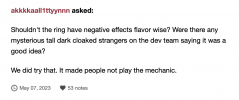In all honesty, as much as it peeves me, this is a good defense. And the follow up:
Look, there are few franchises I care about more than Magic. But the world of Middle Earth is one of them. And yet, I find myself agreeing with Mark.
I understand the need to compromise here - this is modern Magic, after all, with a design that's optimized for, in order: maintaining a growing audience of 30-40M active players, whale-bait, commander, Arena-friendliness, and FOMO. Note that none of those are about making the most interesting gameplay, or following previous design philosophies that were organized around constraints. The only constraints now are "fun" and "does this hit with lowest common denominator fans?"
Even Magic content creators get basic things about the game wrong all the time -- not rules, but things like "what expansion is this" and "what is the point of this mechanic" and "who is this character". The draft environments of yesteryore are dead (unless you make your own Cube
It's fine that the Ring tempts you purely in a positive way. I mean, hey, Bilbo lived to be quite old and happy, right?????

But I still absolutely detest that it's another Dungeon-esque mechanic. Honestly, it makes the below card quite good, which I like theoretically, but I'm going to be skipping any tempting in my cube.
He's pretty good though now that we know what tempting does, is he not???


